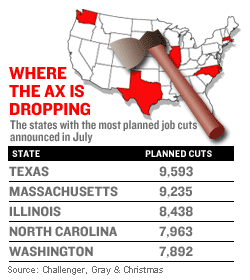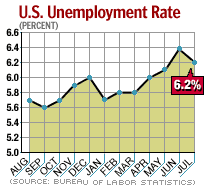NEW YORK (CNN/Money) - U.S. job-cut announcements jumped in July to their highest level in three months, an outplacement firm said Tuesday, another sign that the longest job-market slump since World War II continues.
U.S. employers announced 85,117 job cuts in July, a 43 percent jump from 59,715 in June, according to Chicago-based outplacement firm Challenger Gray & Christmas, which publishes monthly tallies of job-cut announcements.

One troubling aspect of the report is that the size of the cuts ran counter to normal seasonal patterns.
"Summer is always a slow job-cut time. Management is away, and vacations are going on," said Challenger spokesman Herb Rozoff.
June's level of layoffs, the lowest in 31 months, had raised hopes that the labor market was near a turnaround. Other hopeful signs have included a rise in help-wanted advertising, as tracked by the Conference Board, a private research firm, and falling weekly claims for unemployment benefits, as reported by the Labor Department.
But Friday's Labor Department report that non-farm payrolls shrank in July by 44,000 jobs and that more than half a million people left the work force, many of them discouraged by a lack of jobs, was a stark reminder that -- even if a turnaround were in the cards -- it might be slow to develop.
| Related stories
|

|
|
|
|
Unemployment typically lags the rest of the economy, since employers usually wait until a recovery is guaranteed before they hire new workers. But the labor market has been especially lagging lately -- the economy exited a recession in November 2001, according to the National Bureau of Economic Research, but the labor market still hasn't recovered.
In a research note released Monday night, Anthony Chan, chief economist at Banc One Investment Advisors, cited weaker-than-potential economic growth, rising health-care benefit costs, and high productivity growth as the main reasons for the longest jobless recovery -- "job-loss" recovery to some -- since 1944-46.
The danger is not just that consumers, whose spending makes up more than two-thirds of the economy, will become so nervous about their jobs that they stop spending. Just as troublesome is the fact that, in such a weak labor market, people with jobs have little bargaining power, so wage growth could slow down.

"Employers have all the cards," said Challenger Gray & Christmas CEO John Challenger. "Not only are they sharpening their salary pencils, but the screening of candidates is probably the toughest it's ever been."
Challenger spokesman Rozoff said another flood of job-cut announcements could come after Labor Day, when many firms get their budgets for 2004.
The "consumer products" sector was the biggest job cutter in July, with 15,665 jobs lost. Transportation came in second, with 9,820 announced lost jobs. The government/non-profit sector -- which has been the biggest job cutter so far this year -- placed third in July with 9,369 cuts.
Texas saw the most cuts, with 9,593, followed by Massachusetts, with 9,235, and Illinois, with 8,438.

|

